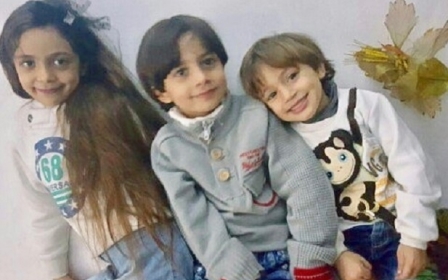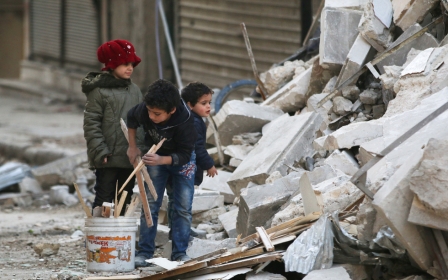UK MPs and religious leaders call for aid drops in Aleppo

Politicians and religious leaders in the UK have issued urgent pleas for aid drops into besieged east Aleppo as the Syrian rebel enclave faced its most catastrophic defeat yet.
A group of 120 MPs and 13 Jewish, Christian and Muslim organisations put out statements on Monday in which they warned that east Aleppo faced distaster without urgent deliveries of food and medicine.
"In eastern Aleppo, an estimated 250,000 people, including 100,000 children, have been cut off from food and medical supplies since August 2016," read the statement released by interfaith leaders. "The UN warns that there will soon be no food left in the besieged part of the city."
"We call on the UK government to take action at an international level, including in the UN General Assembly, and to provide practical support to facilitate the delivery of aid to civilians in the city."
The cross-party parliamentary letter echoed the call, warning Prime Minister Theresa May that “the time for excuses is over” and that “nearly 100,000 children are facing the slowest, cruellest death because we cannot reach them with food and medical supplies”.
Among the signatories were Winston Churchill's grandson Nicholas Soames, shadow business secretary Clive Lewis, and the shadow foreign secretary, Emily Thornberry.
“Air-dropping aid is only ever a last resort, but who can credibly claim we have not reached that point?" asked the letter.
"The Syrian government is refusing all attempts to allow access to UN relief agencies whilst simultaneously dropping chlorine gas onto civilian populations.”
However, the difficulting in delivering aid to rebel controlled areas of Aleppo comes from the potential of coming into conflict with Russian and Syrian jets, which are bombarding the city.
Syrian rebels lost control of all the northern territories they held in east Aleppo on Monday, while thousands of civilians fled to both government-controlled areas and the district of Sheikh Maksoud, which is controlled by the pro-Kurdish People's Protection Units (YPG).
The army captured the Sakhur, Haydariya and Sheikh Khodr on Monday, while the YPG took the Sheikh Fares district from rebels, the Syrian Observatory for Human Rights said.
Reports on Twitter suggested that the YPG had agreed with the rebels to take over five areas rather then let them fall into the hands of government forces.
According to the newspaper al-Watan, which is regarded as close to the government, Bashar al-Assad's forces would now move "to divide the remaining area into security districts that will be easily controlled and to capture them successively" as well as pushing "the gunmen to turn themselves in... or accept national reconciliation under the terms of the Syrian state".
The advances have alarmed international observers, fearing the possibility of a massacre from Syrian government forces., and many have expressed frustration at the inactivity shown on the part of US and European leaders.
“As faith leaders, we are all motivated by our respective faiths to help alleviate those suffering, and as my faith uses the comparable of the suffering of the world to that of one’s body, where if one part suffers, the rest of the body suffers, we cannot stand by and watch thousands on the brink of starvation and do nothing," said Harun Khan, Secretary General of the Muslim Council of Britain.
"We urge the UK government to take urgent action so that much needed aid can reach those in desperate need of it.”
No aid has reached eastern Aleppo since August and supplies are close to running out. The area has been controlled by opposition forces since 2012, when fighting broke out following the suppression of pro-democracy demonstrations by the Assad government.
The British special representative for Syria, Gareth Bayley, said the Syrian government's plan was to turn east Aleppo "into a coffin".
New MEE newsletter: Jerusalem Dispatch
Sign up to get the latest insights and analysis on Israel-Palestine, alongside Turkey Unpacked and other MEE newsletters
Middle East Eye delivers independent and unrivalled coverage and analysis of the Middle East, North Africa and beyond. To learn more about republishing this content and the associated fees, please fill out this form. More about MEE can be found here.




